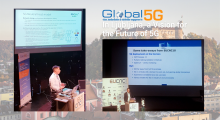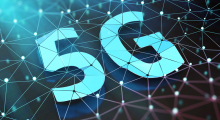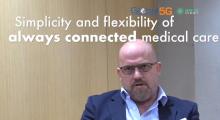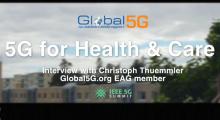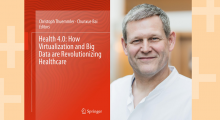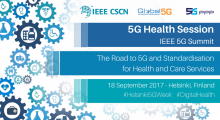
Why 5G health use cases are so important. Now.
The 5G promise of ubiquitous connectivity, mobile broadband with 1000x increased data volumes, 5x lower latency, improved end-user data rates and 10x longer battery life will provide support for an ever-growing number of innovative applications in almost every area of our lives.
The healthcare sector is no exception, but despite the fact that in Europe healthcare stands for over 10% of the GDP budget, its current business model is adapting more slowly than others. Yet the potential improvement enabled by 5 G for patients, doctors, care givers, and society is huge. In order not to miss this opportunity, Europe must take action, now.
Communication is top priority, Milla Immonen – senior scientist at VTT Finland – and Christoph Thuemmler – professor at Napier University Edinburgh – both speakers at the 5G Health session organised by Global5G.org in the IEEE 5G Summit (Helsinki 18 September 2017), agree on this point. While technology progresses and 5G networks become reality, what is still lacking is a better dialogue between the professionals in the telecommunications and in the healthcare sectors.
Trials and testbeds provide the playground for measuring technological advances and future 5G capabilities. Use cases help understand the real-life needs from verticals and potential application to practical scenarios.
As Milla Immonen points out, it is exactly the right moment for 5G health use cases, because “we are still in time to affect standardisation and network developments”. Furthermore, “health professionals might not know what is possible and network developers might not know what is needed”, continues Milla. That’s why the best way to drive innovation is by bringing them together to develop concrete and challenging use cases.
Today’s centralised healthcare model is not sustainable in our ageing society. Access to specialists is nowadays expensive and time consuming with long waiting lists for public health and difficulties for patients in rural areas. By allowing remote consultation, diagnosis and health checks, 5G will decentralise the healthcare model, making specialised and high quality care affordable for all. A specialist will be able to provide expert medical advice to tens of patients, while seated in his/her office, lowering the costs (including for transportation) and drastically reducing the waiting list.
The decentralised healthcare model is not only less expensive both for individuals and for society, but it can also provide huge improvements in the life quality for many patients. For the chronically ill and the ageing population it may offer an otherwise unthinkable degree of independence and autonomy.
A part from home care, 5G opens a wide range of opportunities, including in-hospital applications such as remote or robotic surgery and virtual or augmented reality aided surgery, which require low delays and high quality videos, large image data; emergency scenario applications
Moreover a number of applications will be enabled thanks to patient-generated health data (PGHD) for better diagnosis, and to the huge amount of health data that can be collected, unobtrusively, through sensors and IoT devices, during our entire lifetime: intelligent analysis of this kind of big data will allow improved population health management, early detection of diseases and personalised diagnosis.
Events
06/18/2018 to 06/21/2018
EuCNC2018 Workshop WS1: Vertical Industries & Services for 5G (VIS5G)
02/12/2018 to 02/13/2018
The European 5G Conference 2018
The European 5G Conference will take place on 12th & 13th February 2018 at the Steigenberger Wiltcher’s Hotel, Brussels.
11/01/2017 to 11/03/2017
BIT’s 5th Annual Global Health Conference-2017(AGHC-2017)
BIT’s 5th Annual Global Health Conference-2017(AGHC-2017 ) will be held in Taiyuan, China on November 1-3, 2017.




